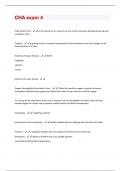CHA exam 4
Tidal Volume (TV) - is the volume of air moved in an out of the respiratory (breathed) during each
ventilatory cycle
Crepitus - a grating sound or sensation produced by friction between bone and cartilage or the
fractured parts of a bone.
Anatomy of Upper Airways - NOTE:
-epiglottis
-pharynx
-larynx
Anatomy of Lower Airway -
Oxygen-Hemoglobin Dissociation Curve - -When the need for oxygen is greater in tissues,
hemoglobin will dissociate oxygen even faster than when tissues have less need for oxygen
-Ex: during an MI, blood flow to the area is reduced, but the hemoglobin that does reach the area
unloads oxygen at a faster rate to prevent cardiac muscle cell death (compensate)
hemoptysis - coughing up blood
paroxysmal nocturnal dyspnea - sudden awakening from sleeping with shortness of breath
Fremitus - a palpable vibration from the spoken voice felt over the chest wall
Orthopnea - ability to breathe only in an upright position
-hard time breathing when laying down
,Classification of Dyspnea - Class 1 (ADL 4): no significant restrictions in normal activity.
Employable. Dyspnea occurs only on more-than-normal or strenuous exertion
Class 2 (ADL 3): independent in essential ADLs but restricted in some other activities. Dyspneic on
climbing stairs or on walking on an incline but not on level walking. Employable for only a sedentary job
or under special circumstances
CLass 3 (ADL 2): dyspnea commonly occurs during usual activities, like showering or dressing, but the
patient can manage without assistance from others. Not dyspneic at rest; can walk for more than a city
block at own pace but cannot keep up with others of own age. May stop to catch breath partway or up a
flight of stairs. Is probably not employable in any occupation.
Class 4 (ADL 1): dyspnea produces dependence on help in some essential ADLs such as dressing and
bathing. Not usually dyspneic at rest. Dyspneic on minimal exertion; must pause on climbing one flight,
walking more than 100 yards or dressing. Often restricted to home if lives alone. Has minimal or no
activites outside the home.
Class 5 (ADL 0): entirely restricted to home and often limited to bed or chair. Dyspneic at rest. Dependent
on help for most needs.
Fine crackles, fine rales, high pitched rales - -popping, discontinuous sounds caused by air moving
into previously deflated airways
-sounds like hair being rolled between fingers near the ear
-"velcro" sounds late in inspiration usually associated with restrictive disorders
Associated with: asbestosis, atelectasis, interstitial fibrosis, bronchitis, pneumonia, COPD
Coarse crackles, low-pitched crackles - -Lower-pitched, coarse, rattling sounds caused by fluid or
secretions in large airways;
,-likely to change with coughing or suctioning
Associated with: bronchitis, pneumonia, tumors, pulmonary edema
Wheeze - -Squeaky, musical, continuous sounds associated with air rushing through narrowed
airways, may be heard without a stethoscope
-arise from small airways
-usually do not clear with coughing
Associated with: inflammation, bronchospasm, edema, secretions, asthma, pulmonary vessel
enlargement
Rhoncus (rhonchi) - -lower pitched, coarse, continuous snoring sounds
-arise from the large airways
Associated with: thick tenacious secretions, sputum production, obstruction by foreign body, tumors
pleural friction rub - -loud, rough, grating, scratching sounds caused by the inflamed surfaces of
the pleura rubbing together, often associated with pain during deep inspirations
-heard in lateral lung fields
Associated with: pleurisy, TB, pulmonary infarction, pneumonia, lung cancer
Relevant Respiratory Labs - CBC
-RBCs (o2 carrying capabilities)
-Hemoglobin (o2 carrying)
, -WBC (increase = infection, associated with symptoms)
ABGs ( decrease air exchange, respiratory acidosis, hypercampnia)
Imagine and Diagnostic Tests - *CXR (PA and LL vs. portable (AP))
-CT of chest, usually with contrast
-V/Q scan: for pulmonary emboli
-Pulmonary Function Test (asthma, COPD)
-6 or 12 min walk test (hypoxic with activity)
-skin tests (PPD, TB)
-bronchoscopy
-thoracentesis
FVC (Forced vital capacity) - -records the maximum amount of air that can be exhaled as quickly as
possible after maximum inspiration
Purpose: indicates respiratory muscle strength and ventilatory reserve (asthma)
FEV1 (forced expiratory volume in 1 second) - -records the maximum amount of air that can be
exhaled in the first second of expiration
Purpose: is effort dependent and declines normally with age. It is reduced in certain obstructive and
restrictive disorder (asthma)




